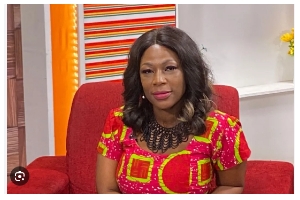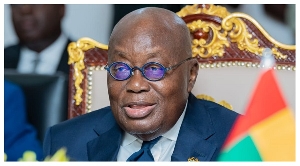Opinions of Monday, 8 October 2012
Columnist: Mensah, Dominic
Is Ghana in need of a Political Saviour?
The 2012 Manifestos of NDC and NPP: Is Ghana in need of a Political Saviour?
With copies of the 2012 manifestos of both NDC and NPP now accessible to the general public, Ghanaian electorates are called upon to read, analyze, compare and contrast them if they are to make a discerning judgement come December 7. Unfortunately, even to the trained mind, it's not always easy to tell the difference between a MANIFESTO (manifesto: a public declaration of intentions, opinions, objectives, or motives, as one issued by a government, sovereign, or organization) and PROPAGANDA (propaganda: when a government says one thing to intentionally get the public to believe something that is mostly lies). How many of those qualified to vote are actually going to read these manifestos in order to identify the illusions and delusions of Ghanaian politics or hold their party leaders responsible when they fail to fulfill their gargantuan promises? But like they say, "A promise is indeed a comfort to a 'fool'."
The NDC manifesto, "Advancing The Better Ghana Agenda," presents Ghana as a nation with minimal issues; the NDC elites seem to have solved Ghana's major issues within four years and are therefore asking Ghanaians to give them the mandate to maintain and improve the standard they've accomplished. Thus we read:
"This Manifesto is based on the achievements over the last four (4) years during which period we established a firm foundation...Since we resumed office in 2009, our country has made significant progress, attaining and sustaining middle income status for the first time in our history, maintaining a substantial growth rate and reducing inflation to single digit consistently.... The opportunities to provide access and quality education to ALL our children is achieved... We have invested in people and created a solid foundation for launching a SOCIAL COMPACT during the second term of the NDC administration. This social compact is based on a charter of commitments to Invest in People through Education, Health, Pensions, Social Protection, Persons with Disabilities, the Aged, Youth and Child Development, Women’s Empowerment and Sports. Education is at the heart of the development of people. Under this charter, the NDC commits to “Quality Education for All,” guaranteeing equitable access for ALL, from basic to secondary education."
Contrasting this with chapters on the same theme in the NPP 2012 manifesto, "Transforming lives, Transforming Ghana," we read:
"This year’s election is a historic moment for Ghana. Ghanaians have a simple choice to make in either moving forward with the NPP or staying with the failed policies and personalities of the NDC administration that have brought them hardships and poverty...Our education system is in serious crisis. Out of a 100 of our children that start kindergarten, only 71 end up in primary school, only 65 will go up to junior high school and only 3 will end up in university... At all stages, many of our children and youth fall out because they cannot afford to go on. The level of wastage is too high.”
Interestingly, the framers of these two documents appear to live in two different Ghanas and as a result, have created a new Ghana in their minds to project issues aimed at playing mind-games on Ghanaians. How could they have these uncompromising views on the same issue if they lived in the same country? There are days, however, when are forced to be believe that they are the same people using different names, both oblivious to the complex problems normal Ghanaians face. What follows is to inquire what we are called upon to vote for this time. Hasn't everyone one of them been active in Ghanaian politics longer than necessary already? What else do they have to offer us today that they couldn't offer us when they were cabinet ministers, vice presidents, MPs, and so on? What are their former achievements that make them deserve a second chance today? Assessing the contents of the manifestos of the two main parties, one is pushed to reason that Ghana is desperately in need of a political savior. But who is going to be that savior?
As it stands, the hope of Ghana lies with its citizens. Only an enlightened Ghanaian mass can redeem Ghana. Without a critical mass to demand the right course of actions from its leaders and to dispose them when necessary, the future of Ghana remains gloomy in the hands of its immature (mis)managers who appear to lack intelligent foresight.
Regrettably, Ghanaian electorates are unconscious of how powerful they are at this time of the electoral year. We have rather allowed ourselves to become instruments of partisans instead of coming together to fight for the common course of universal national growth and development. And our media, which is supposed to play the role of educating the public to this end has become both corrupt and politically biased. Most of our various media houses and their representatives have allowed their party affiliations to get in the way of their professional practice. Given this picture, one doesn't have to wonder why Ghana lacks politicians whose visions and policies go beyond how the next elections could be won.
To the party-neutral critical Ghanaian, who believes political disagreement can be done with civility, the aim of the coming election is to give us the chance to elect politicians who must work for our interest. And our interest, without a second thought, must side with the future of our voiceless children. As parents and responsible adults given the privilege to affect who leads our motherland, these innocent children are asking us to stop caring about our fanatic party loyalty and consider the right candidate to manage our nation-state come December. Sticking to our party's candidates regardless of their incompetence is unnecessary stupidity, economically wasteful, and constitutes a moral atrocity with the welfare of our children in mind. These voiceless children are telling Ghanaian politicians and leaders that they are Ghana's greatest resources and not the vast material and natural resources the land possesses. They are therefore pleading with us to stop enriching ourselves with the resources and invest in their potentials because they are the future of our motherland. It's up to us to collectively create a greater and united Ghana of which our children and grandchildren could be proud. This is their land, their future is our responsibility! We can no longer allow our unaccountable leaders manipulate us into tearing our dear nation apart.
My simple message is that only intelligence will save Ghana. We need a discerning critical mass if we are to realistically hope for good governance. We must admit that the current corrupt and visionless leadership is, however, a reflection of our collective misdeeds. Thus, every single one of us is called upon to transform his or her deeds if we are to see Ghana progress. We are all responsible as individuals. We can no longer allow our party affiliations to serve as guaranteed support for our non-delivering politicians. Decentering ourselves from our immediate interests in favor of public welfare will at least help us make a wiser decision in two months. Our developmental salvation lies within our political and psychological transformation.
Dominic Mensah
ghanafuturenow@gmail.com












